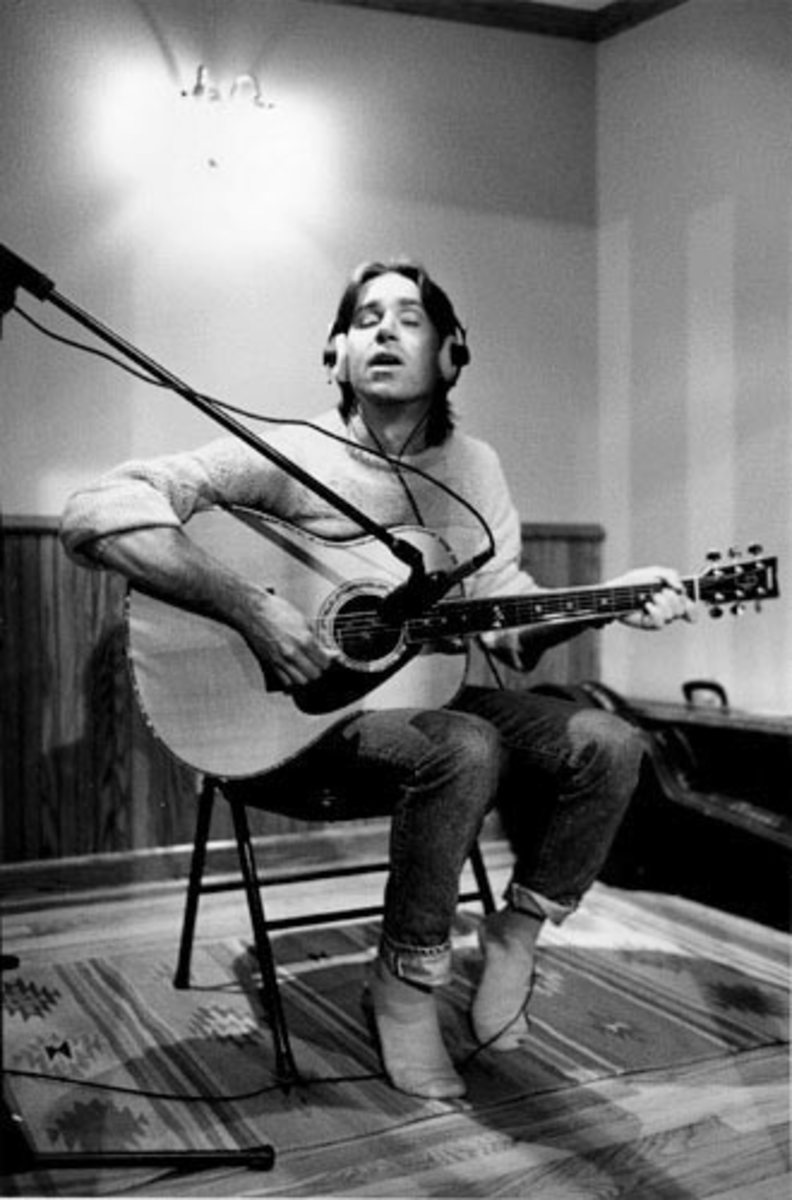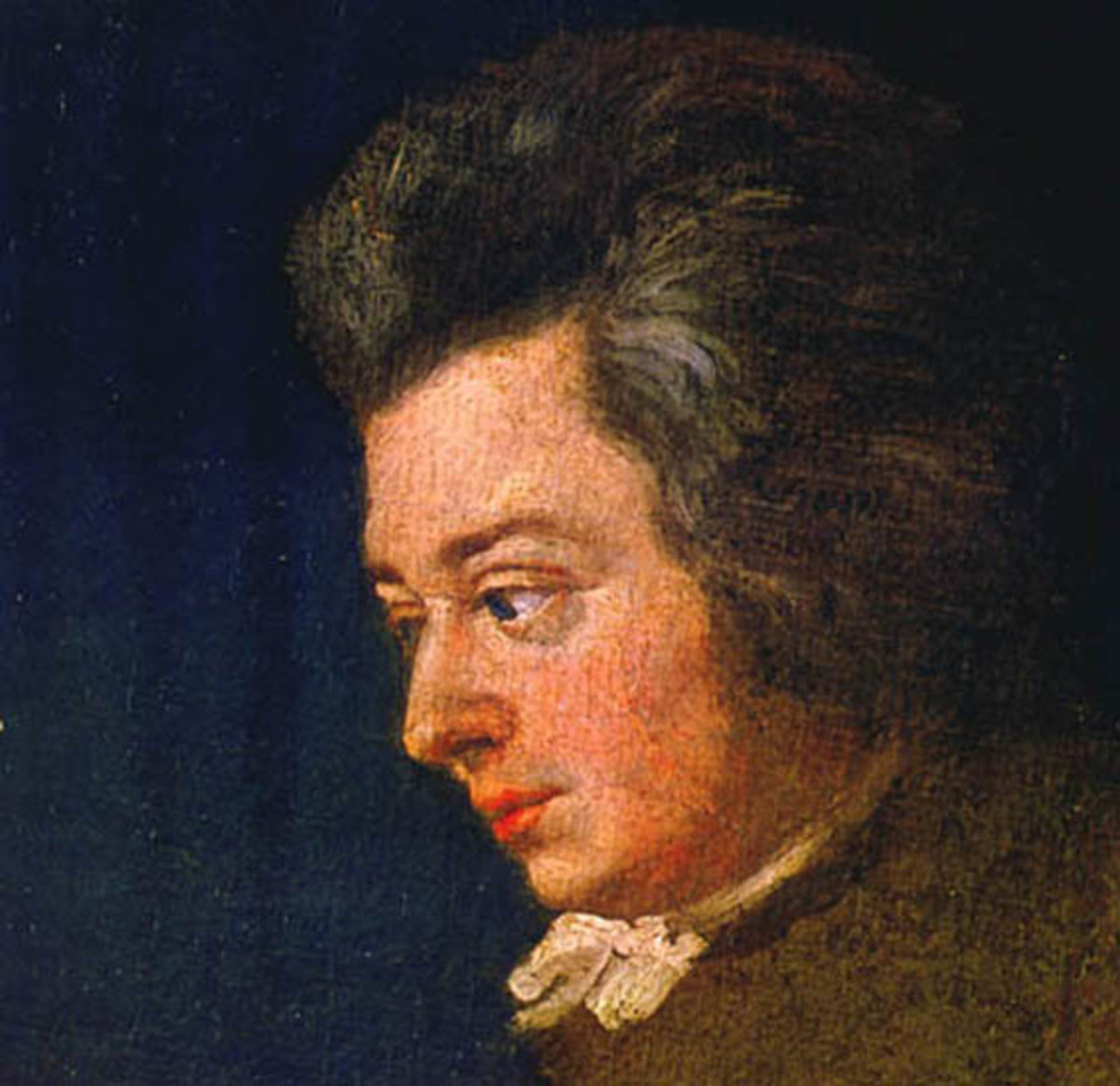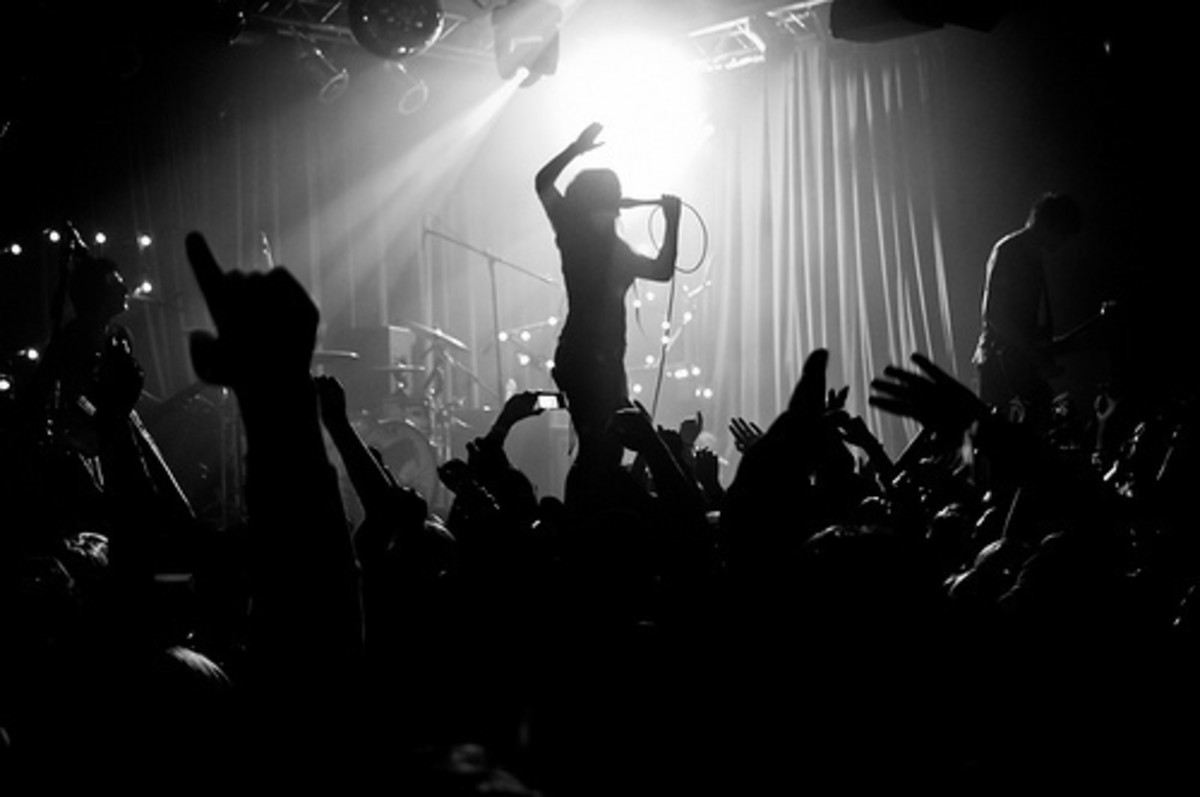Beethoven's Life and Music
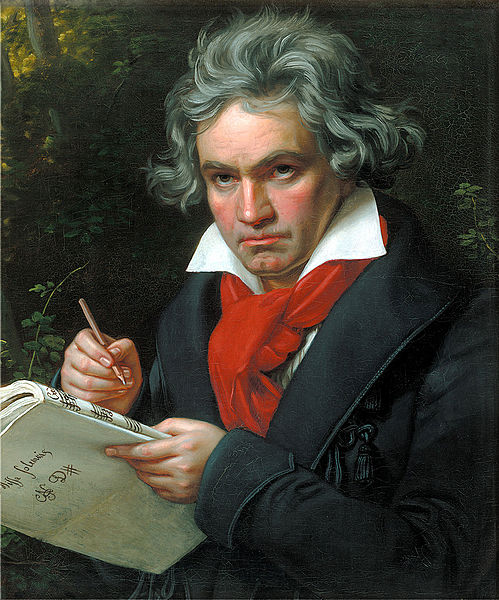
Introduction to Ludwig van Beethoven 1770-1827
Beethoven is one of the most interesting European composers who has ever lived. He is still often considered to be the best European composer more than two centuries since he was born. His personality and personal life is also as interesting and compelling as his music and the two often complimented each other. He and his work is considered to be what began the "romantic period" in European arts. In this lens, I hope to provide a brief biography and introduction to his music and compositions.
All artwork on this lens comes from Wikipedia Commons and is in the public domain.
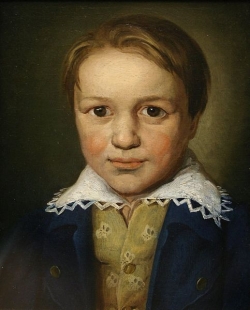
Early Life and Study
1770-1792
Beethoven was baptized in Bonn, Germany, on December 17th, 1770, but his friends and relatives generally celebrated his birthday on December 16th. Ludwig was the second of seven children born in his family, all of whom had died except Ludwig and his two younger brothers, Carl and Nikolaus Johann (mostly referred to as Johann). He was named after his grandfather who was the former music director and bass singer for the local Electorate of Cologne.
His father, Johann van Beethoven, was, himself, an accomplished musician and tenor who also made money as a music teacher on the side. He was also was Ludwig's first teacher as well. Various rumors state that Ludwig was born into a poor family or that his father was prone to drinking and abuse, but no concrete evidence is available to show that this was the case, at least during his early life. Both his father and mother both came from accomplished, respectable working families and the family, overall, was well respected in the community. However, some insight to his father's character can be shown in how he attempted to cash in on the fame of Mozart by promoting his son as a child prodigy and saying he was younger than he was at the time of his first public concert in 1778.
Not long afterward, he began to study with Christian Gottlob Neefe who became his most influential person in Ludwig's early musical life. Not only did he teach Beethoven composition and got him published, he also offered him his first paid position as an organist in the court chapel. This helped him get the attention and admiration of people in important and influential social circles that would help him throughout his entire life.
When he was 16, in 1787, he took a trip to Vienna, possibly to meet Mozart. Little is known about this trip, but it is said that he did meet with Mozart who said positive things about him. However, Ludwig had to leave abruptly as his mother was ill with tuberculosis. She died shortly after his return. His mother's death had a profound effect on his father who became severely alcoholic to the point where he had difficult earning a living. It was then that Ludwig had to be the breadwinner of the family. Also at this time, he was introduced to more people that helped him financially and got him paid work. Franz Wegeler, for example, introduced him to the Von Bruening family who not only provided him with an income as an instructor, but also treated him like a member of the family. Eventually, Ludwig got a court order forcing his father to give him half his salary to help support the family in 1789. At this time, time he also got a job playing viola in the court orchestra. This helped him further his studies by exposing him to more operas and he made more influential friends.
In 1790, Ludwig met Haydn for the first time while the older composer was on his way back from London. They met again in 1792 and it was arranged that Ludwig would move to Vienna around that time. Between 1790 and 1792, it is said that he wrote a few compositions, none were published, but certain parts were said to be used in later compositions. When he arrived in Vienna, there were rumors of impending war and when he arrived, he found out that his father had died as well.
His two brothers joined him in Vienna shortly after their father's death.
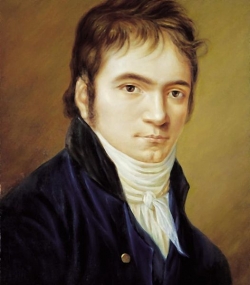
Early Adulthood
1792-1802
During his early 20s, Ludwig devoted himself to study and instruction. He wasn't planning on becoming a composer at this time. At first, he studied under Haydn, but it was said that he was a difficult student. This combined with Haydn's advanced age probably made it difficult for Ludwig to get much out of studying with him. Later, he studied under many other teachers such as Salieri, Schuppanzigh, and Albrechtsberger.
After his stipend from the Elector of Cologne expired, he began to make money as a virtuoso and his talent was immediately recognized. He made more influential connections who offered him work and financial support. He played in the salons of nobility in Vienna and a friend of his began to publish his compositions. Ludwig actually held off publishing many of his compositions until after his first public performance in Vienna in 1795. The first publication of which there is an Opus number for is of three piano trios, dedicated to Prince Lichnowsky, one of his best patrons.
In his late 20s and through his early 30s, Beethoven began publishing many works, including symphonies. At first, his works fit the formula of classical music of the day, but they always had the uniqueness that made them Beethoven. As he matured as a composer, the works began to take on more deepness and uniqueness that would later develop in music during the "romantic period" after his death. His first symphony was performed on April 2, 1800 in a theater that he had hired and during a program that he personally arranged. Other symphonies, concertos and sonatas, many of them well known like the Moonlight Sonata, were also published during this time.
It was also said that he made extra money by tutoring several students, including one that he had a serious romantic interest in. Ludwig often was attracted to women who were considered "above his station". Class society was very rigid in Europe during this time period and, usually, unless the person "beneath" the class can show that he/she can contribute greatly to the family, such marriages almost never happened. Since Ludwig was shown to often be emotionally unstable, he lived simply, and had no title, he was not considered good marriage material to many of the women's fathers and male relatives.
During this time period, Ludwig began to notice that there was something wrong with his ears. It first started out with tinnitus which became very loud and distracting. He found it difficult to hear music and hold a conversation. This also made him fearful and frustrated and enhanced his already turbulent personality. At times, he felt like life is not worth living as he feared his deafness would make it impossible for him to compose and earn a living.
List of major works published by Beethoven from 1795-1802
Here is a list of major works published by Ludwig van Beethoven from 1795 to 1802. Many smaller works were published before this time and many works were published posthumously and are not listed here. Also, not all works that were published during this time, hence the skipping of opus numbers. The dates listed are when they were actually published, not when they were first performed.
- Opus 1: Three Piano Trios (1795)
- Opus 8: String Trio No. 2 (Serenade) (1797)
- Opus 11: Piano Trio No. 4 (Gassenhauer) (1797)
- Opus 13: Piano Sonata No. 8 (Pathetique) (1799)
- Opus 21: Symphony No. 1 (1800)
- Opus 27 (b): Piano Sonata No. 14 (Moonlight) (1801)
- Opus 31 (b): Piano Sonata No. 17 (Tempest) (1802)
- Opus 43: The Creatures of Prometheus overture and ballet music (1801)
- Opus 31 (c): Piano Sonata No. 18 (Hunt) (1802)
Take your Beethoven music on the go!
How about an iPod shuffle to listen to your Beethoven music?

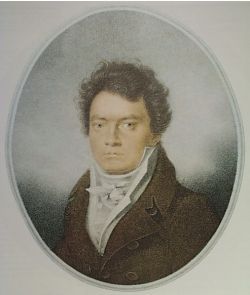
Musical Maturity
1803-1817
1803 was a pivotal year for Ludwig and his music. He had published his second symphony and was about to publish a third that was dedicated to Napoleon Bonaparte. Ludwig had admired Napoleon because of his political views, but his feelings changed when Napoleon crowned himself emperor, Ludwig became disgusted with the man and changed the dedication from Napoleon Bonaparte to just Eroica. This was the period in which his music really began to change.
During this period, the people around him began to notice his hearing difficulties and his family life began to suffer. This was complicated by a loss of income. At first, he made a most of his money from public performances and publishing his work. However, in 1804, his position at the Theater an der Wien was ended when a new owner took over. He then had to rely more on friends for help. He also had trouble with his only opera, Fidelio, passing the Austrian censor. There were also problems with wars and conflicts due to Napoleon and his campaign through Europe. He often feared the noise from the bombing would destroy the rest of his hearing.
By 1811, he became seriously ill and begun a battle of illnesses that would last him the rest of his life. He also had constant conflicts with his brothers and problems with his romantic life. For a while, he slowed down on writing compositions and his appearance began to deteriorate. Some people compared him to being a beggar or homeless person. But, later, in 1813, he was inspired to start writing again when one of Napoleon's armies was defeated by the Duke of Wellington. Shortly afterward, his work was being publicly performed again and was immediately a hit.
But, in 1815, his health began to suffer again and his output dropped. It was also said that he was, again, having problems with his personal life with the death of his brother Carl and the custody battle over his nephew, Karl. Ludwig considered Carl's wife, Johanna, an unfit mother because of her morals. She had another child by another man out of wedlock and had been arrested for stealing. However, he was only given joint custody in the end. All of this took a toll on his work output during this time.
Major works published by Beethoven 1803-1817
Again, this is not a comprehensive list, but a list of major compositions in order of publication (not when they were first performed).
- Opus 36: Symphony No. 2 (1803)
- Piano Sonata No. 21 (Waldstein) (1803)
- Opus 55: Symphony No. 3 (Eroica) (1805)
- Opus 57: Piano Sonata No. 23 (Appassionata) (1805-1806)
- Opus 59: Three String Quartets (Rasumovsky) (1806)
- Opus 60: Symphony No. 4 (1806)
- Opus 62: Coriolan Overture (1807)
- Opus 67: Symphony No. 5 (1807-1808)
- Opus 68: Symphony No. 6 (Pastoral) (1807-1808)
- Opus 70 (a): Piano Trio No. 5 (Ghost)
- Opus 72: Fidelio (Opera) (1803-1805)
- Opus 73: Piano Concerto No. 5 (Emperor) (1809)
- Opus 74: String Quartet No. 10 (Harp)
- Opus 80: Choral Fantasy (1808)
- Opus 84: Egmont overture (1810)
- Opus 91: Wellington's Victory (1813)
- Opus 92: Symphony No. 7 (1812)
- Opus 93: Symphony No. 8 (1812)
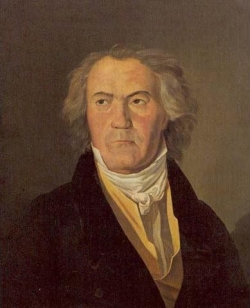
Late life and death
1818-1827
By 1818, Ludwig was on the mend and doing much better. His nephew, Karl, had moved in with him, but found life difficult as his uncle couldn't even have a conversation with him. Karl used a notebook to write down his end of the conversation. Later, the nephew and uncle had many difficulties that ended up with Karl attempting suicide at one point, devastating his uncle and causing his health to suffer.
Also at this time in his life, Ludwig's deafness was profound and most people who saw or knew him were well aware of it. However, it did not stop him from composing music during this period and earning some income.
He began the work on a couple major works that were commissioned such as the Missa Solemnis and the Ninth Symphony. However, his illness returned and he wasn't able to finish the works until well after they were due. Both the Missa Solemnis and the Ninth Symphony, were performed in 1824 to much acclaim. His last works were mostly string quartets that his contemporaries criticized as being poorly written and hard to play. Later musicians appreciated the works as being truly ground-breaking for the time.
During his last years, his health continued to fail and he remained bedridden and in pain for most of his last days of life. When he died, it is said that 20,000 people came to see his funeral procession on March 29, 1827. It is unknown, exactly had killed him, but there are many guesses. Some suggest syphilis or alcohol poisoning, some suggest accidental poisoning, and others suspected a disease that caused "dropsy" (edema) such as heart failure, kidney disease, or cirrhosis. His body was exhumed in 1862 and parts of his hair and skull are still preserved, but no definite cause of death has been determined. It was noted that his ear nerves were extremely enlarged at the time of his death.
It is also worth noting that even though he lived his last years in what would seem to be extreme poverty, he actually had a good sized bank account when he died that should have enabled him to live a little better.
Major Works Published by Beethoven 1818-1827
Dates given are dates published, not performed.
- Opus 123: Missa Solemnis (1823)
- Opus 125: Symphony No. 9 (Choral)
Some of my favorite Beethoven music from Amazon.
Here are some albums and places to download Beethoven's works on Amazon.


Favorite Beethoven Music
What is your favorite Beethoven piece of music?
Beethoven and a text of his work
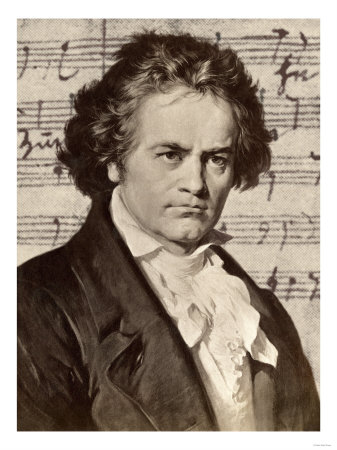
Ludwig Van...
12 in. x 16 in.
Buy This at Allposters.com
This is a print of Beethoven taken after a portrait of him in his 40s.
Other Beethoven Sites
Here are a few links to other good sites on Ludwig van Beethoven.
- Biography: Beethoven's life
Biography of Beethoven's life and music. - Beethoven: The Immortal
Very comprehensive overview of the master. - Ludwig van Beethoven, the Magnificent Master
A comprehensive biography on Ludwig van Beethoven
Do you like Beethoven's music? What kind of classical music do you like?

